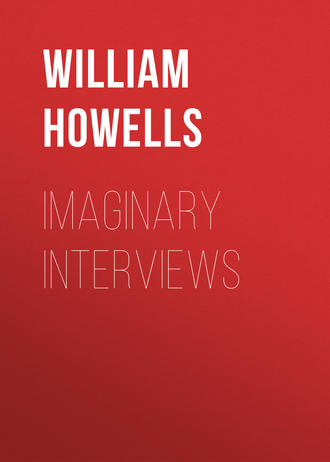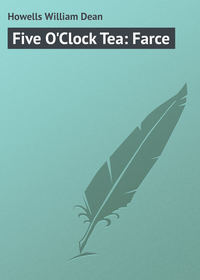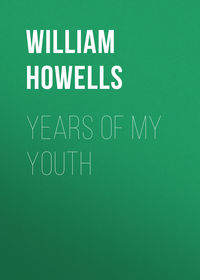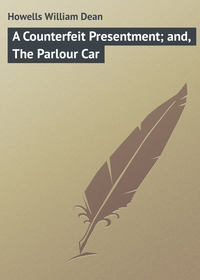 полная версия
полная версияImaginary Interviews
"Suppose he had a wife and children – he may have had several of both, for all I know – dependent on him, would it have been particularly sanative for them to be deprived of his earnings, too?"
"We cannot answer these sophistries," we were exasperated into replying. "All that we can say is that anything else – anything like what you call justice to the criminal, the prisoner – would disrupt society," and we felt that disrupt was a word which must carry conviction to the densest understanding. It really appeared to do so in this case, for our friend went away without more words, leaving behind him a manuscript, which we mentally rejected, while seeing our way to use the material in it for the present essay; it is the well-known custom of editors to employ in this way the ideas of rejected contributors.
A few days later we met our friend, and as we strolled beside him in the maniacal hubbub of the New York streets, so favorable to philosophic communion, we said, "Well, have you met your namesake since you came to his rescue against the robber State, or did he really sail on the cattle-steamer, as he said he was going to do?"
Our friend gave a vague, embarrassed laugh. "He didn't sail, exactly, at least not on that particular steamer. The fact is, I have just parted from him at my own door – the outside of it. It appears that the authorities of that particular line wished to take advantage of him by requiring him to pay down a sum of money as a guarantee of good faith, and that he refused to do so – not having the money, for one reason. I did not understand the situation exactly, but this was not essential to his purpose, which made itself evident through a good deal of irrelevant discourse. Since I had seen him, society had emulated the State in the practice of a truly sanative attitude toward him. At the place where he went to have his half-crown changed into American money they would only give him forty cents for it, but he was afterward assured by an acquaintance that the current rate was sixty cents. In fact, a half-crown is worth a little more."
"Well, what can you expect of money-changers?" we returned, consolingly. "And what is going to become of your unhappy beneficiary now?"
"Why, according to his report, fortune has smiled, or half-smiled, as the novelists say, upon him. He has found a berth on another line of cattle-steamers, where they don't require a deposit as a guarantee of good faith. In fact, the head steward has taken a liking to him, and he is going out as one of the table-stewards instead of one of the herdsmen; I'm not sure that herdsmen is what they call them."
We laughed sardonically. "And do you believe he is really going?"
Our friend sighed heavily. "Well, I don't believe he's coming back. I only gave him the loose change I had in my pocket, and I don't think it will support him so handsomely to the end of the week that he will wish to call upon me for more."
We were both silent, just as the characters are in a novel till the author can think what to make them say next. Then we asked, "And you still think he had been in the penitentiary?"
"I don't see why he should have said so if he wasn't."
"Well, then," we retorted bitterly, again like a character in fiction, "you have lost another great opportunity: not a moral opportunity this time, but an æsthetic opportunity. You could have got him to tell you all about his life in prison, and perhaps his whole career leading up to it, and you could have made something interesting of it. You might have written a picaresque novel or a picaresque short story, anyway."
Our friend allowed, with a mortified air, "It was rather a break."
"You threw away the chance of a lifetime. Namesakes who have been in jail don't turn up every day. In his intimate relation to you, he would have opened up, he would have poured out his whole heart to you. Think of the material you have lost."
We thought of it ourselves, and with mounting exasperation. When we reflected that he would probably have put it into his paper, and when we reflected that we could have given so much more color to our essay, we could not endure it. "Well, good-day," we said, coldly; "we are going down this way."
Our friend shook hands, lingeringly, absently. Then he came to himself with a mocking laugh. "Well, perhaps he wasn't, after all, what he said."
XVIII
A NIECE'S LITERARY ADVICE TO HER UNCLE
A Veteran Novelist, who was also an intimate friend of the Easy Chair's, sat before his desk pensively supporting his cheek in his left hand while his right toyed with the pen from which, for the moment at least, fiction refused to flow. His great-niece, who seemed such a contradiction in terms, being as little and vivid personally as she was nominally large and stately, opened the door and advanced upon him.
"Do I disturb you, uncle?" she asked; she did not call him great-uncle, because that, she rightly said, was ridiculous; and now, as part of the informality, she went on without waiting for him to answer, "Because, you know, you wanted me to tell you what I thought of your last story; and I've just read it."
"Oh yes!" the Veteran Novelist assented brightly, hiding his struggle to recall which story it was. "Well?"
"Well," she said, firmly but kindly, "you want me to be frank with you, don't you?"
"By all means, my dear. It's very good of you to read my story." By this time, he had, with the help of the rather lean volume into which his publishers had expanded a long-short story, and which she now held intensely clasped to her breast, really remembered.
"Not at all!" she said. She sat down very elastically in the chair on the other side of his desk, and as she talked she accented each of her emotions by a spring from the cushioned seat. "In the first place," she said, with the effect of coming directly to business, "I suppose you know yourself that it couldn't be called virile."
"No?" he returned. "What is virile?"
"Well, I can't explain, precisely; but it's something that all the critics say of a book that is very strong, don't you know; and masterful; and relentless; and makes you feel as if somebody had taken you by the throat; and shakes you up awfully; and seems to throw you into the air, and trample you under foot."
"Good heavens, my dear!" the Veteran Novelist exclaimed. "I hope I'm a gentleman, even when I'm writing a novel."
"Your being a gentleman has nothing to do with it, uncle!" she said, severely, for she thought she perceived a disposition in the Veteran Novelist to shuffle. "You can't be virile and at the same time remember that you are a gentleman. Lots of women write virile books."
"Ladies?" the novelist asked.
"Don't I say that has nothing to do with it? If you wish to grip the reader's attention you must let yourself go, whether you're a gentleman or a lady. Of course," she relented, "your book's very idyllic, and delightful, and all that; but," she resumed, severely, "do you think an honest critic could say there was not a dull page in it from cover to cover?"
The novelist sighed. "I'm sure I don't know. They seem to say it – in the passages quoted in the advertisements – of all the books published. Except mine," he added, sadly.
"Well, we will pass that point," his great-niece relented again. "I didn't intend to wound your feelings, uncle."
"Oh, you haven't. I suppose I am a little too easy-going at times."
"Yes, that is it. One can't say dull; but too easy-going. No faithful critic could begin a notice of your book with such a passage as: 'Have you read it? No? Then hop, skip, and jump, and get it. Don't wait to find your hat or drink your coffee. March! It's going like the wind, and you must kite if you want one of the first edition of fifty thousand!' Now that," his great-niece ended, fondly, "is what I should like every critic to say of your book, uncle."
The Veteran Novelist reflected for a moment. Then he said, more spiritedly, "I don't believe I should, my dear."
"Then you must; that's all. But that's a small thing. What I really wonder at is that, with all your experience, you are not more of a stylist."
"Stylist?"
"Yes. I don't believe there's an epigram in your book from beginning to end. That's the reason the critics don't quote any brilliant sentences from it, and the publishers can't advertise it properly. It makes me mad to find the girls repeating other authors' sayings, and I never catch a word from a book of yours, though you've been writing more than a century."
"Not quite so long, my dear, I think; though very, very long. But just what do you mean by style?"
"Well, you ought to say even the simplest things in a distinguished way; and here, all through, I find you saying the most distinguished things in the simplest way. But I won't worry you about things that are not vital. I'll allow, for the sake of argument, that you can't have virility if you remember that you are a gentleman even when you are writing fiction. But you can have passion. Why don't you?"
"Don't I? I thought – "
"Not a speck of it – not a single speck! It's rather a delicate point, and I don't exactly know how to put it, but, if you want me to be frank, I must." She looked at her great-uncle, and he nodded encouragement. "I don't believe there's a single place where he crushes her to his heart, or presses his lips to hers in a long kiss. He kisses her cheek once, but I don't call that anything. Why, in lots of the books, nowadays, the girls themselves cling to the men in a close embrace, or put their mouths tenderly to theirs – Well, of course, it sounds rather disgusting, but in your own earlier books, I'm sure there's more of it – of passion. Isn't there? Think!"
The Veteran Novelist tried to think. "To tell you the truth, my dear, I can't remember. I hope there was, and there always will be, love, and true love, in my novels – the kind that sometimes ends in happy marriage, but is always rather shy of showing itself off to the reader in caresses of any kind. I think passion can be intimated, and is better so than brutally stated. If you have a lot of hugging and kissing – "
"Uncle!"
" – How are your lovers different from those poor things in the Park that make you ashamed as you pass them?"
"The police ought to put a stop to it. They are perfectly disgraceful!"
"And they ought to put a stop to it in the novels. It's not only indecent, but it's highly insanitary. Nice people don't want you to kiss their children, nowadays, and yet they expect us novelists to supply them with passion of the most demonstrative sort in our fiction. Among the Japanese, who are now one of the great world-powers, kissing is quite unknown in real life. I don't know the Japanese fiction very well, but I doubt whether there's a single kiss, or double, in it. I believe that a novel full of intense passion could be written without the help of one embrace from beginning to end."
"Uncle!" the girl vividly exclaimed, "why don't you do it? It would be the greatest success! Just give them the wink, somehow, at the start – just hint that there was the greatest kind of passion going on all the time and never once showing itself, and the girls would be raving about it. Why don't you do it, uncle? You know I do so want you, for once, to write the most popular book of the month!"
"I want to do it myself, my dear. But as to my writing a book full of suppressed passion, that's a story in itself."
"Tell it!" she entreated.
"The Easy Chair wouldn't give me room for it. But I'll tell you something else. When I was a boy I had a knack at versing, which came rather in anticipation of the subjects to use it on. I exhausted Spring and Morning and Snow and Memory, and the whole range of mythological topics, and then I had my knack lying idle. I observed that there was one subject that the other poets found inexhaustible, but somehow I felt myself disqualified for treating it. How could I sing of Love when I had never been in love? For I didn't count those youthful affairs when I was only in the Third Reader and the first part of the Arithmetic. I went about trying to be in love, as a matter of business; but I couldn't manage it. Suddenly it managed itself; and then I found myself worse disqualified than ever. I didn't want to mention it; either to myself or to her, much less to the world at large. It seemed a little too personal."
"Oh, uncle! How funny you are!"
"Do you think so? I didn't think it much fun then, and I don't now. Once I didn't know what love was, and now I've forgotten!"
"No such thing, uncle! You write about it beautifully, even if you're not very virile or epigrammatic or passionate. I won't let you say so."
"Well, then, my dear, if I haven't forgotten, I'm not interested. You see, I know so much more about it than my lovers do. I can't take their point of view any longer. To tell you the truth, I don't care a rap whether they get married or not. In that story there, that you've been reading, I got awfully tired of the girl. She was such a fool, and the fellow was a perfect donkey."
"But he was the dearest donkey in the world! I wanted to h – shake hands with him, and I wanted to kiss – yes, kiss! —her, she was such a lovable fool."
"You're very kind to say so, my dear, but you can't keep on making delightful idiots go down with the public. That was what I was thinking when you came in and found me looking so dismal. I had stopped in the middle of a most exciting scene because I had discovered that I was poking fun at my lovers."
"And here I," the girl lamented, "didn't take the slightest notice, but began on you with the harshest criticisms!"
"I didn't mind. I dare say it was for my good."
"I'm sure I meant it so, uncle. And what are you going to do about it?"
"Well, I must get a new point of view."
"Yes?"
"I must change my ground altogether. I can't pretend any longer to be the contemporary of my lovers, or to have the least sympathy with their hopes and fears. If I were to be perfectly honest with them, I should tell them, perhaps, that disappointed love was the best thing that could happen to either of them, but, if they insisted on happiness, that a good broken engagement promised more of it than anything else I could think of."
"That is true," the girl sighed. "There are a great many unhappy marriages. Of course, people would say it was rather pessimistic, wouldn't they?"
"People will say anything. One mustn't mind them. But now I'll tell you what I've been thinking all the time we've been talking."
"Well? I knew you were not thinking of my nonsense!"
"It was very good nonsense, as nonsense goes, my dear. What I've been thinking is that I must still have the love interest in my books, and have it the main interest, but I must treat it from the vantage-ground of age; it must be something I look back upon, and a little down upon."
"I see what you mean," the girl dissentingly assented.
"I must be in the whole secret – the secret, not merely of my lovers' love, but the secret of love itself. I must know, and I must subtly intimate, that it doesn't really matter to anybody how their affair turns out; for in a few years, twenty or thirty years, it's a thousand to one that they won't care anything about it themselves. I must maintain the attitude of the sage, dealing not unkindly but truthfully with the situation."
"It would be rather sad," the girl murmured. "But one likes sad things."
"When one is young, one does; when one is old, one likes true things. But, of course, my love-stories would be only for those who have outlived love. I ought to be fair with my readers, and forewarn them that my story was not for the young, the hopeful, the happy."
The girl jumped to her feet and stood magnificent. "Uncle! It's grand!"
He rose, too. "What is?" he faltered.
"The idea! Don't you see? You can have the publisher announce it as a story for the disillusioned, the wretched, and the despairing, and that would make every girl want it, for that's what every girl thinks she is, and they would talk to the men about it, and then they would want it, and it would be the book of the month! Don't say another word. Oh, you dear!" In spite of the insanitary nature of the action, she caught her uncle round the neck, and kissed him on his bald spot, and ran out of the room. She opened the door to call back: "Don't lose a single minute. Begin it now!"
But the Veteran Novelist sank again into his chair in the posture in which she had surprised him.
XIX
A SEARCH FOR CELEBRITY
We lately received a publication which has interested us somewhat out of proportion to its size. It is called The Way into Print, but it does not treat, as the reader might rashly suppose, of the best method of getting your name into the newspapers, either as a lady who is giving a dinner to thirteen otherwise unknown persons, or is making a coming-out tea for her débutante daughter, or had a box full of expensively confectioned friends at the opera or the vaudeville, or is going to read a paper at a woman's club, or is in any sort figuring in the thousand and one modern phases of publicity; it does not even advise her guests or hearers how to appear among those present, or those who were invited and did not come, or those who would not have come if they had been invited. Its scope is far more restricted, yet its plane is infinitely higher, its reach incomparably further. The Print which it proposes to lead the Way into is that print where the elect, who were once few and are now many, are making the corridors of time resound to their footsteps, as poets, essayists, humorists, or other literary forms of immortality. Their procession, which from the point of the impartial spectator has been looking more and more like a cake-walk in these later years, is so increasingly the attraction of young-eyed ambition that nothing interests a very large class of people more than advice for the means of joining it, and it is this advice which the publication in point supplies: supplies, we must say, with as much good sense and good feeling as is consistent with an office which does not seem so dignified as we could wish.
Inevitably the adviser must now and then stoop to the folly of the aspirant, inevitably he must use that folly from time to time with wholesome severity, but he does not feel himself equal to the work unaided. Our sudden national expansion, through the irresistible force of our imaginative work, into an intellectual world-power has thrust a responsibility upon the veterans of a simpler time which they may not shirk, and the author of The Way into Print calls upon them to share his task. He is not satisfied with the interesting chapters contributed by younger authors who are in the act of winning their spurs, but he appeals to those established in the public recognition to do their part in aiding us to hold our conquest through the instruction and discipline of those who must take their places when they put their armor off. He does this by means of a letter, almost an open letter, addressed personally to each veteran by means of the substitution of his typewritten name for that of some other veteran, but not differenced in the terms of the ensuing appeal to his kindness or his conscience. He puts himself upon a broad humanitarian ground, and asks that the typewritten author, who, he assumes, is "prominently before the public," shall answer certain questions to which the appellant owns that he has already received hundreds of replies.
By an odd mischance one of his half-open letters found its way to the Easy Chair, and, although that judgment-seat felt relieved from the sense of anything like a lonely prominence before the public by the very multitude of those similarly consulted, it did not remain as Easy as it would have liked under the erring attribution of prominence. Yet to have refused to help in so good a work would not have been in its nature, and it lost as little time as possible in summoning a real author of prominence to consider the problems so baffling to a mere editorial effigy; for, as we ought to explain, the de facto editor is to be found in the Study next door, and never in the Easy Chair. The author prominently before the public came at once, for that kind of author has very little to do, and is only too happy to respond to calls like that of the friend of rising authorship. Most of his time is spent at symposiums, imagined by the Sunday editions of the newspapers, to consider, decide the question whether fig-paste is truly a health-food; or whether, in view of a recent colossal gift for educational purposes, the product of the Standard Oil Company was the midnight oil which Shakespeare had in mind when he spoke of the scholar wasting it; or something of that kind. His mind is whetted to the sharpest edge by its employment with these problems, and is in prime condition for such simple practical inquiries as those proposed by the letter we had received. But, of course, he put on an air of great hurry, and spoke of the different poems, novels, essays, and sketches which he had laid aside to oblige us, and begged us to get down to business at once.
"We wish nothing better than to do so," we said, to humor him, "for we know you are a very busy man, and we will not keep you a moment longer than is absolutely necessary. Would you like to have all the questions at once, or would you rather study them one after another?"
He said he thought he could better give an undivided mind to each if he had them one at a time, and so we began with the first:
"'1. Would you advise the young story-writer to study the old masters in literature or the stories in the current magazines, in order to meet the demands of the current editors?'"
"Will you read that again?" the author prominently before the public demanded, but when we had read it a second time it seemed only to plunge him deeper into despair. He clutched his revered head with both hands, and but for an opportune baldness would probably have torn his hair. He murmured, huskily, "Do you think you have got it right?"
We avoided the response "Sure thing" by an appropriate circumlocution, and then he thundered back: "How in – nature – is a young writer to forecast the demands of current editors? If an editor is worth his salt – his Attic salt – he does not know himself what he wants, except by the eternal yearning of the editorial soul for something new and good. If he has any other demands, he is not a current editor, he is a stagnant editor. Is it possible that there is a superstition to the contrary?"
"Apparently."
"Then that would account for many things. But go on."
"Go on yourself. You have not answered the question."
"Oh, by all means," the author sardonically answered; "if the current editor has demands beyond freshness and goodness, let the young writer avoid the masters in literature and study the stories in the current magazines."
"You are not treating the matter seriously," we expostulated.
"Yes, I am – seriously, sadly, even tragically. I could not have imagined a condition of things so bad, even with the results all round us. Let us have the second question of your correspondent."
"Here it is: '2. Has the unknown writer an equal chance with the well-known author, provided his work is up to the standard of the latter's?'"
"Of the latter's? – of the latter's? – of the latter's?" Our friend whispered the phrase to himself before he groaned out: "What a frightful locution! Really, really, it is more than I can bear!"
"For the cause you ought to bear anything. What do you really think?"
"Why, if the former's work is as good as the latter's, why isn't the former's chance as good if the current editor's demands are for the same kind in the former's case as in the latter's? If the latter's aim is to meet the imaginary demands of the stagnant editor, then the former's work ought to be as attractive as the latter's. Ha, ha, ha!"
He laughed wildly, and in order to recall him to himself we read the third question: "'3. Which is the more acceptable – a well-told story with a weak plot, or a poorly told story with a strong plot?'"
"Oh, but that is a conundrum, pure and simple!" the author protested. "It is a poor parody on the old End-man pleasantry, 'Would you rather be as foolish as you look, or look as foolish as you are?' You are making it up!"









